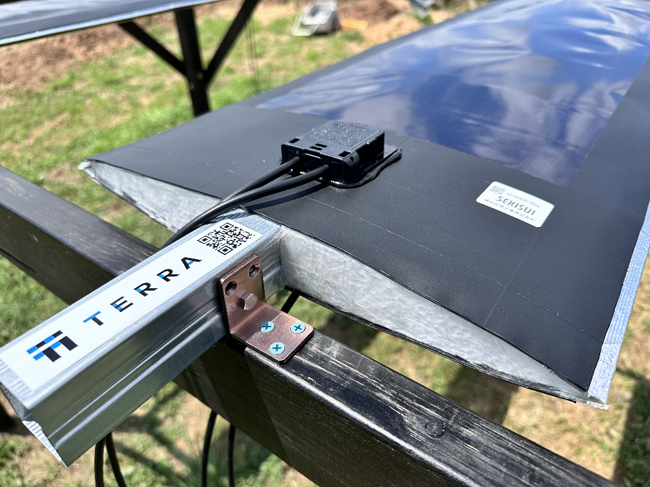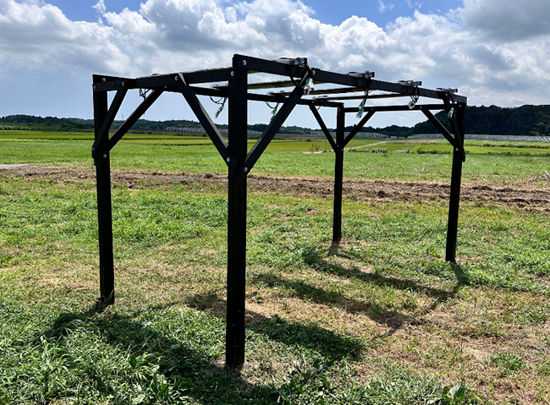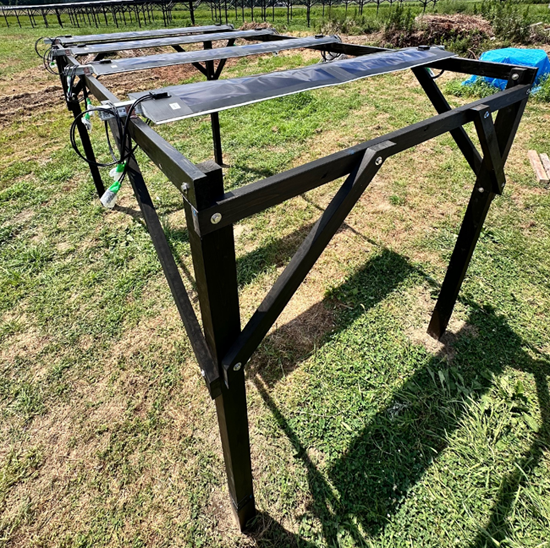SEKISUI CHEMICAL CO., LTD. (President and Representative Director: Keita Kato; hereinafter “SEKISUI CHEMICAL”) and TERRA Co., Ltd. (Representative Director: Mitsuhiro Higashi ; hereinafter “TERRA”) announce that they have commenced the first joint demonstration test (hereinafter the “demonstration test”) in Japan to install film-type perovskite solar cells for agrivoltaics (solar sharing) at Sosa City, Chiba Prefecture on August 2, 2024.
1. Background of demonstration test
Climate change is seen as a global issue. As the decarbonization of energy is required to realize a decarbonized society by 2050, film-type perovskite solar cells are seen as a promising option to expand the introduction of renewable energy. They are lightweight and flexible, enabling installation in a variety of locations at various sites where it is difficult to install conventional silicon-based solar cells.
SEKISUI CHEMICAL has created a 30 cm-wide roll-to-roll manufacturing process utilizing its original “sealing, film formation, materials and process technology,” and have confirmed 10 years equivalent of outdoor durability, which is said to be critical to the development of film-type perovskite solar cells. Furthermore, this manufacturing process has been successfully used to produce film-type perovskite solar cells with a power generation efficiency of 15.0%. Development is being accelerated to further improve durability and power generation efficiency, as well as to establish manufacturing technology for 1 m-wide rolls.
TERRA is a company that specializes in agrivoltaics (solar sharing) and engages in in-house power generation, engineering, procurement, and construction (EPC), consulting, and component development. It also collaborates with its group company Citizen Energy Chiba Co., Ltd. (hereinafter “Citizen Energy Chiba”) as the pioneering companies in agrivoltaics (solar sharing) to cooperate with Patagonia International Inc., Japan Branch, SAZABY LEAGUE, Ltd. , and J. LEAGUE, Inc. to actively pursue initiatives toward achieving the Sustainable Development Goals (SDGs) as well as achieving carbon neutrality by 2050. Chiba Prefecture’s Sosa City was selected as a Decarbonization Leading Area by the Ministry of the Environment and TERRA is also a participant in those initiatives. At the same time, TERRA also works on creating various projects across Japan, from Okinawa to Hokkaido. Focusing on a comprehensive view of environmental issues, it has an established reputation in proposing systems founded on improving agricultural management, and also engages in business in the sixth industry * such as Solar Beer “SORA ALE ”.
TERRA has possessory rights over the patent held by Citizen Energy Chiba for a module with a lens-shaped cross section based on perovskite solar cells. Thinking that it is possible to introduce film-type and curved lens-type perovskite solar cells to agrivoltaics (solar sharing) by using the expertise accumulated so far, including the design of ultra-slim structures and anchoring methods, TERRA decided to embark on this demonstration test toward installation of film-type perovskite solar cells.
Through the installation of film-type perovskite solar cells, data that is useful for agrivoltaics (solar sharing)—such as the power generation efficiency of curved surfaces in lens-shaped modules and growth environment of agricultural crops—will be collected and verified.

Film-type perovskite solar cell arranged in a curved lens-shape
2. Details of demonstration test
1) Location
Iizuka, Sosa City, Chiba Prefecture, JAPAN
2) Demonstration details
・Establishment of film-type perovskite solar cell installation method for agrivoltaics (solar sharing)
・Measurement of power generation efficiency of curved surfaces in lens-shaped modules and comparison of predicted and actual values
・Investigation of impact to agricultural crops being grown under equipment for agrivoltaics (solar sharing)
In conventional agrivoltaics solar power generation systems, there were issues in areas such as workability, including wind load and balancing the center of gravity to support the weight of the solar cells and mounts. Demonstration has been started to verify mount configuration and workability using the lightweight characteristics of perovskite solar cells.


Equipment being used in demonstration test
3. Future development
SEKISUI CHEMICAL and TERRA will contribute to the realization of a decarbonized society through joint development that includes establishing a method for introducing renewable energy into agrivoltaics (solar sharing) through this demonstration test, deploying of agrivoltaics to various cultivated land—including paddy fields—nationwide in Japan, further expanding its application scope in the agricultural field, and using perovskite solar cells on idle and abandoned agricultural land.
* Sixth industry
The promotion of the sixth industry refers to the effective use of regional resources by operators in agriculture, forestry, and fishery sectors (primary industry operators) for proactive efforts (diversification of business) in processing (secondary industry) as well as distribution and retail (tertiary industry).
Specific examples of such efforts include the manufacture and retail of processed items, direct sales to consumers, and operation of tourist farms and farmers’ restaurants.
About SEKISUI CHEMICAL Group
Headquartered in Japan, SEKISUI CHEMICAL CO., LTD. (TSE: 4204) and its subsidiaries make up the SEKISUI CHEMICAL Group. 26,000 employees in over 156 companies throughout 20 countries and regions aim to contribute to improving the lives of the people of the world and the earth’s environment. Thanks to a history of innovation, dedication and a pioneering spirit, SEKISUI CHEMICAL now holds leading positions in its three diverse business divisions as well as top global market share in interlayer film, foam products, conductive particles and more.
Press Contact
SEKISUI CHEMICAL CO., LTD.
Corporate Communication Department
Email: kouhou@sekisui.com
Disclaimer
This press release may contain forward-looking statements. Such forward-looking statements are based on current expectations and beliefs and are subject to a number of factors and uncertainties that could cause actual results to differ materially from those expressed or implied by such statements due to changes in global economic, business, competitive market and regulatory factors.


